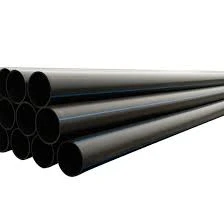nov . 09, 2024 22:02 Back to list
Understanding the Benefits and Applications of HDPE Plastic Pipes in Modern Infrastructure
The Advantages and Applications of HDPE Plastic Pipes
High-Density Polyethylene (HDPE) plastic pipes have revolutionized various industries with their exceptional properties and versatile applications. Known for their strength, durability, and resistance to corrosion and chemicals, HDPE pipes are increasingly favored over traditional piping materials like steel and concrete. This article explores the benefits of HDPE pipes and their myriad applications in different sectors.
Strength and Durability
One of the primary advantages of HDPE plastic pipes is their remarkable strength and durability. Made from high-density polyethylene, these pipes boast a high tensile strength, making them resistant to impact and pressure. They are designed to withstand extreme weather conditions, including high temperatures and ultraviolet radiation, which often cause damage to conventional piping materials. As a result, HDPE pipes can have a prolonged lifespan, typically lasting over 50 years, which offers significant financial savings over time due to reduced maintenance and replacement costs.
Resistance to Corrosion and Chemicals
Another notable characteristic of HDPE pipes is their resistance to corrosion and a wide range of chemicals. Unlike metal pipes that can corrode or rust, HDPE pipes do not degrade in contact with aggressive substances, making them suitable for various industrial applications. This property is especially important in the chemical, oil, and gas industries, where pipelines often transport corrosive substances. The inert nature of HDPE ensures that the pipes maintain their structural integrity and performance over time, reducing the risk of leaks and environmental contamination.
Lightweight and Flexible
hdpe plastic pipe

HDPE pipes are significantly lighter than their steel counterparts, making them easier to handle and install. This lightweight nature reduces transportation costs and simplifies the installation process, allowing for faster project completion. Moreover, HDPE pipes are highly flexible, which is advantageous in projects requiring routing around obstacles or when ground movement occurs. The flexibility of HDPE also makes it an excellent choice for trenchless installation techniques, such as horizontal directional drilling, minimizing disruption to the surrounding environment.
Environmental Impact
In an increasingly eco-conscious world, the environmental benefits of HDPE pipes are noteworthy. They are made from a recyclable material, contributing to a circular economy and reducing plastic waste. Additionally, the manufacturing process of HDPE pipes typically consumes less energy compared to the production of traditional piping materials. Their durability and resistance to leakage also minimize the risk of environmental contamination, further reinforcing their reputation as an environmentally friendly option.
Diverse Applications
The versatility of HDPE pipes spurs their use across various industries. In municipal applications, they are commonly used for water distribution systems, sewage systems, and stormwater management. In agriculture, HDPE pipes are utilized for irrigation systems, ensuring that water is delivered efficiently and sustainably. The oil and gas sector also relies on HDPE for transporting crude oil and natural gas due to its chemical resistance and durability. Additionally, the construction industry benefits from HDPE for drainage systems and below-ground utility conduits.
Conclusion
In conclusion, HDPE plastic pipes present a multitude of advantages, including superior strength and durability, resistance to corrosion and chemicals, lightweight and flexible properties, and a lower environmental impact. Their versatility allows for extensive applications across various sectors, making them a preferred choice in today’s infrastructure development. As industries continue to evolve and seek sustainable solutions, the demand for HDPE pipes is likely to grow, solidifying their role as an essential element of modern piping systems. With ongoing advancements in technology and manufacturing practices, the future of HDPE pipes appears bright, promising even greater innovations in design and application.
-
HDPE Natural Sheet: Durable, Food-Grade & Versatile Plastic Solutions
NewsAug.27,2025
-
Durable Glossy PVC Rigid Sheet | Premium High-Shine Panels
NewsAug.26,2025
-
Durable PP Rigid Sheet: Lightweight, Chemical Resistant Solutions
NewsAug.21,2025
-
PVC Grey Sheet for Extraction: Chemical Resistant & Durable
NewsAug.19,2025
-
Durable PVC Pipe Fittings for Plumbing & Irrigation Needs
NewsAug.18,2025
-
HDPE Steel Belt Reinforced Spiral Corrugated Pipe | High Strength
NewsAug.17,2025

